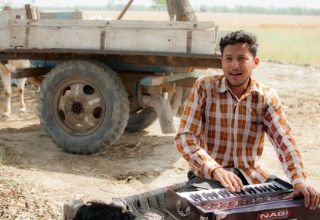Gagan Singh

Background: Not from Farming Family
Size of Farm – 7 acres, 2 under organic
Average Number of Farm Workers: Himself
Location: Barnala district, Punjab
What led you to start natural farming?
I was attracted by farming, and I was inspired by traditional songs by Yamla Jutt. He has written many songs about traditional farming and these inspired me to take up the practice. Farming allows me to stay close to nature, it is just like worship; you can get close to God through this work. This is why I started this natural farming.
Did you have any role models when you started Natural Farming? Who helped you get started?
At first I met Gurmail Singh Gunike who lives about 32 km from here. After that, I met Amarjeet Sharma and was deeply inspired. He has been my main role model in natural farming. My motive for this farming is to conserve the indigenous seeds. I want to collect the maximum varieties I can and distribute them amongst the farmers. KVM supported me by connecting me with the other farmers, visiting my farm, and offering suggestions
What crops do you grow? How many cattle do you have?
I grow sugarcane, fodder crop (barseem), wheat, grams, flax seed, pulses and sesamum. There should be four or five crops in one field. I grow millets and sorghum for home consumption. I still grow paddy and wheat using chemicals on 5 acres. I have three buffalos and two desi bulls, one I purchased from Sharma Ji.
How did your friends and family respond to your decision to be an organic farmer?
People say you don’t look nice working with these bulls, that I look medieval. So people make jokes of me. People thought I had gone mad. Even my father brought a tractor salesman to my farm and tried to convince me to buy, but I love to work with the bulls. I just thought, I will show you. I am in love with this work and want to show people it can be done.
What natural farming techniques do you use?
The best type of manure is made from leaves. I make a heap of leaves, pour cow manure and urine on it and allow it to sit. I use some spray derived from a green manure called aak.
What struggles have you faced?
Right now, the soil is not up to the quality of our ancestors, so it is difficult to plow it with bulls. It takes a long time so I can only do it on two acres right now. This kind of farming is very beneficial for a small farmer. Before I used to plow a large area with my bulls. It took such a long time that the moisture level in the soil went down which hurt the germination period. These traditional equipment is also not easy to arrange. The traditional craftsman are no longer there, so I needed to train the bulls on my own.
Are there other people who have seen what you are doing and gone into natural farming?
Some of my friends tried thinking it was the cheapest way to farm, but it was too difficult for them. One or two of my friends are very interested in natural farming and seed multiplying as a social work, but they are just helping me right now.
What are your farming inputs?
I have to purchase some cow dung for the fields. My Desi cows eat less, they need less fodder than these HF cows which can only do 4 or 5 lactations in their lifetime and take up more resources. I have no problem feeding them. Other inputs include cow dung and goat manure. When I change my crop rotation using one dicot and one moncot, I will no longer need these inputs. I am the biggest follower of Sharma Ji, he is a saintly man and has multiplied many varieties of seeds.
How can natural farming be promoted? How will you share these values with your family?
We should advertise that people should at least do this for their own consumption. If people are growing for their own, the people in the cities may notice and demand that they also get chemical free food.
I have one child, I will try to attach my child to the land, but it is their choice and I cannot pressure them. If a person has his own interest, he will do this work. This feeling must be genuine. I do this because I love to do it, if my child does not love it, then he should not do it.
What do you plan to do in the future?
I plan to continue to multiply seeds in the future. This way of farming is designed for a small area of land, so I don’t intend to spread it to the rest of my 5 acres. My main plan is to multiply seed, grow for my own consumption and work using traditional practices. If I completely switched on 7 acres, it may be too difficult for me to work in these traditional ways.